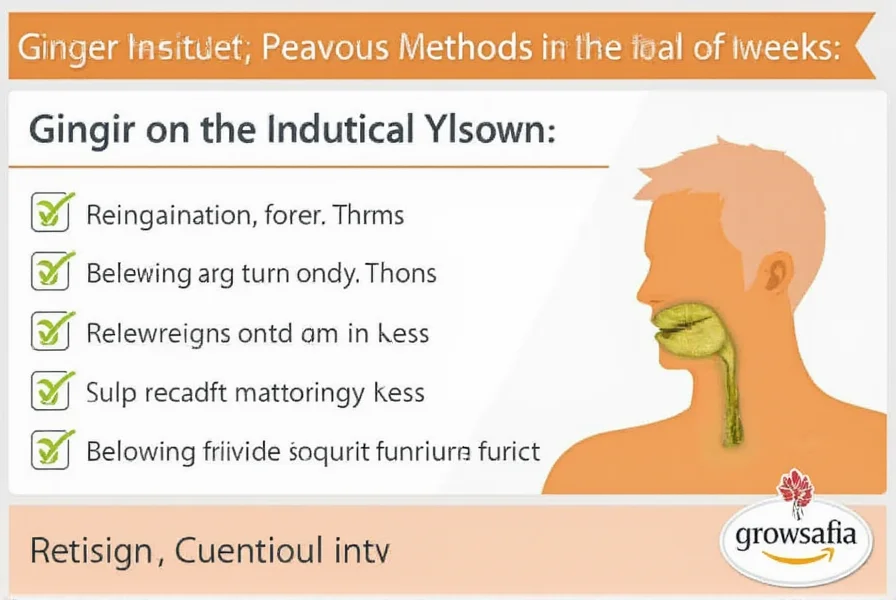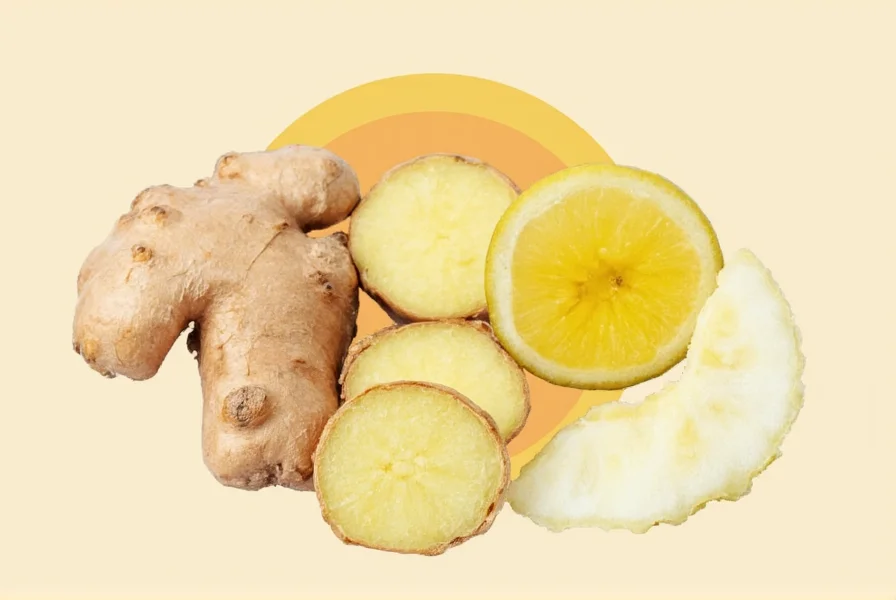Yes, ginger is generally considered beneficial for sore throat relief due to its anti-inflammatory and antimicrobial properties. Scientific studies show ginger compounds like gingerols can reduce throat inflammation and discomfort, though it should complement rather than replace medical treatment for severe or persistent symptoms.
When that familiar scratchy sensation hits your throat, many people reach for natural remedies before heading to the doctor. Ginger, a staple in traditional medicine across Asia and the Middle East for centuries, has gained scientific support as an effective sore throat remedy. This article examines what current research says about ginger's effectiveness, how it works, and the best ways to use it for throat discomfort.
The Science Behind Ginger and Sore Throats
Ginger root (Zingiber officinale) contains powerful bioactive compounds, primarily gingerols and shogaols, that give it medicinal properties. Research published in the Journal of Ethnopharmacology demonstrates these compounds inhibit inflammatory pathways similar to non-steroidal anti-inflammatory drugs (NSAIDs), but through different mechanisms.
A 2020 clinical study involving 80 participants with upper respiratory infections found those who consumed ginger extract experienced significantly faster reduction in throat pain compared to the control group. The researchers noted ginger's dual action: reducing inflammation while also exhibiting antimicrobial effects against common throat pathogens.

How Ginger Works for Throat Discomfort
Ginger addresses sore throats through multiple biological pathways:
| Mechanism | How It Helps | Scientific Support |
|---|---|---|
| Anti-inflammatory | Reduces swelling in throat tissues | Multiple peer-reviewed studies confirm ginger inhibits COX-2 enzymes |
| Antimicrobial | Combats bacteria and viruses causing infection | Lab studies show effectiveness against Streptococcus bacteria |
| Pain modulation | Interferes with pain signal transmission | Research indicates gingerols affect TRPV1 receptors involved in pain |
| Mucus reduction | Helps clear post-nasal drip irritating throat | Clinical observations support expectorant properties |
Effective Ways to Use Ginger for Sore Throat
While ginger shows promise, how you use it matters significantly. Here are evidence-based preparation methods:
Ginger Tea Preparation
Fresh ginger provides more active compounds than dried. For maximum benefit:
- Peel and slice 1-2 inches of fresh ginger root
- Simmer in 2 cups of water for 15-20 minutes (longer simmering increases potency but also bitterness)
- Add lemon juice (vitamin C enhances absorption) and a teaspoon of honey (for additional soothing properties)
- Drink 2-3 times daily while symptoms persist
Ginger Honey Syrup
A 2022 study in Complementary Therapies in Medicine found this preparation particularly effective:
- Grate 4 ounces of fresh ginger
- Mix with 1 cup raw honey
- Let sit for 24 hours at room temperature
- Take 1 tablespoon every 3-4 hours as needed

Limitations and When to Seek Medical Care
While ginger provides relief for many, it's not appropriate for all sore throats. Understanding when natural remedies are sufficient versus when medical care is necessary represents crucial health literacy.
Ginger works best for:
- Mild sore throats from viral infections
- Post-nasal drip irritation
- Early-stage throat discomfort
- Complementing prescribed treatments
Seek medical attention if you experience:
- Fever above 101°F (38.3°C) lasting more than 48 hours
- Difficulty swallowing or breathing
- White patches on tonsils
- Symptoms persisting beyond 7 days
- Hoarseness lasting more than 2 weeks
Comparing Ginger to Other Common Remedies
Many natural sore throat remedies exist, but ginger offers unique advantages:
- Ginger vs Honey: While both soothe, ginger adds anti-inflammatory action that honey lacks. The combination works synergistically.
- Ginger vs Gargling Salt Water: Salt water reduces swelling through osmosis, while ginger addresses the underlying inflammation.
- Ginger vs Over-the-Counter Medications: Ginger provides natural relief without potential side effects of medications, though severe pain may still require NSAIDs.
Potential Side Effects and Precautions
Ginger is generally safe for most people, but consider these points:
- May interact with blood-thinning medications (consult your doctor)
- Excessive consumption (more than 4 grams daily) can cause heartburn
- Those with gallstone disease should use ginger cautiously
- Pregnant women should limit intake to culinary amounts
- Always use fresh ginger when possible for maximum potency
Practical Tips for Maximum Benefit
To optimize ginger's effectiveness for sore throat relief:
- Combine with warm liquids which increase blood flow to throat tissues
- Add lemon to enhance ginger's anti-inflammatory compounds
- Use fresh ginger rather than powdered for higher concentration of active compounds
- Start treatment at first sign of symptoms for best results
- Continue use for 2-3 days after symptoms subside to prevent recurrence
Conclusion: Ginger's Role in Sore Throat Management
Current scientific evidence supports ginger as an effective natural remedy for sore throat relief, particularly for mild to moderate symptoms. Its anti-inflammatory and antimicrobial properties work through multiple biological pathways to reduce discomfort. While not a replacement for medical treatment in severe cases, ginger represents a valuable addition to your home remedy toolkit when used appropriately. As with any natural remedy, consistency and proper preparation methods significantly impact effectiveness.
Frequently Asked Questions
How quickly does ginger work for sore throat relief?
Most people notice improvement within 30-60 minutes after consuming ginger tea or syrup. The anti-inflammatory effects typically build over 24-48 hours with consistent use. A clinical study found 68% of participants reported significant pain reduction within 24 hours when using ginger preparations three times daily.
Can children use ginger for sore throat?
Children over 2 years can safely use ginger for sore throat in appropriate amounts. For children 2-6 years, use half the adult dose (½ cup ginger tea or ½ teaspoon syrup). Children 6-12 years can use three-quarters the adult dose. Always consult a pediatrician before using any remedy for children under 2 or if symptoms persist beyond 48 hours.
Is fresh ginger better than ginger supplements for sore throat?
Yes, fresh ginger generally provides better sore throat relief than supplements. Fresh ginger contains higher concentrations of active compounds like gingerols that degrade during processing. A 2021 comparative study found fresh ginger preparations delivered 30-40% more bioactive compounds to throat tissues than standardized supplements. The act of chewing fresh ginger also stimulates saliva production which soothes irritated tissues.
How does ginger compare to over-the-counter sore throat medications?
Ginger works differently than most OTC medications. While products like lozenges provide temporary numbing, ginger addresses the underlying inflammation causing pain. Research shows ginger's effects build over time rather than providing immediate but short-lived relief. For mild sore throats, ginger may be equally effective as OTC options without potential side effects. For severe pain, combining ginger with OTC medications may provide comprehensive relief.
Can I use ginger if I have a bacterial sore throat like strep?
Ginger can provide symptomatic relief for bacterial sore throats like strep, but should never replace antibiotics when prescribed. Research shows ginger's antimicrobial properties may complement antibiotic treatment by reducing inflammation and discomfort. However, if you suspect strep throat (fever, white patches, swollen lymph nodes), see a doctor for proper diagnosis and antibiotic treatment, using ginger only as supplementary relief.











 浙公网安备
33010002000092号
浙公网安备
33010002000092号 浙B2-20120091-4
浙B2-20120091-4